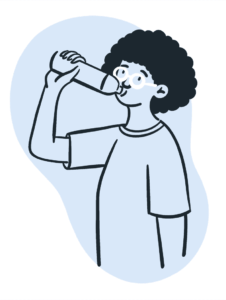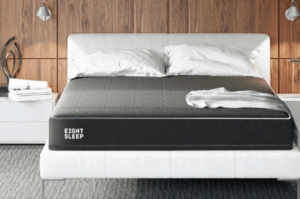Can Sleep Improve Athletic Performance?
Disclosure: By clicking on the product links in this article, Mattress Nerd may receive a commission fee at no cost to you, the reader. Read full disclosure statement.
Athletes are often looking for an edge to remain competitive, whether it’s more specialized training or the right diet. But what about optimizing for shut-eye? According to multiple studies, getting more high-quality sleep can improve athletic performance. Here’s what we know about sleep and performance and how to take advantage of its benefits.
Benefits of Sleep for Athletes
Sleep is essential for health, no matter how active you are. Since athletes often put in long, physically demanding hours of training, adequate sleep time is particularly important. It even offers some benefits that can support athletic performance.
Interestingly, those benefits may vary depending on the sport itself. Some research suggests that sports in which speed, tactical strategy, and technical skill are requirements for success are more likely to be impacted by sleep duration and quality.
Speed and accuracy
Studies find that sleep disturbances are associated with reduced physical performance among athletes. The reverse is true as well. Longer, better sleep can help improve athletic performance and competitive success.
Reduced risk of illness and injury
Athletes and non-athletes alike need sleep to maintain a functioning immune system. Melatonin regulates immune response, which means sleep is when our immune systems are restored. For athletes in particular, studies show that better sleep can minimize the risk of both illness and injury.
Recovery time
For athletes training week in and week out, overtraining can be a real risk. Studies show that sleep as a strategy optimizes recovery, which makes it a key factor in minimizing that risk. During sleep, the body releases hormones to build and repair muscle, burn fat, and accelerate bone growth. But the reverse is true too – a sleep debt can lead to the loss of muscle mass and slow muscle recovery.
Research Behind Sleep and Athletic Performance
The evidence for sleep and athletic performance is mounting, and the link between the two really can’t be overlooked.
Quality Sleep and Improved Performance
- Athletes with improved sleep duration and quality perform better. A review from 2017 found that athletes who prioritize sleep are more likely to do better in competition and may also perform better in activities that require stamina, accuracy, and a fast reaction time.
- Athletes who prioritize sleep are less likely to get sick. The same review also identified training availability as a requirement for athletic success and determined that athletes can minimize risk of illness and injury with adequate sleep.
Lack of Sleep and Decreased Performance
- A lack of sleep affects reaction time and increases risk of injury. The 2017 study also identified the issues a lack of sleep poses for athletes. Specifically, when training load increases and sleep duration decreases, the risk of injury goes up. That may be due in part to the fact that reaction time slows and cognitive function is impaired as a result of reduced sleep. Insufficient sleep also means athletes are experiencing higher levels of fatigue, which can increase injury risk.
- Insufficient sleep reduces time to exhaustion. An older study found that endurance is significantly impaired when athletes don’t get enough sleep. Later research corroborated the finding, which is that time to exhaustion is reduced. For athletes who need to perform at their peak for a long time, this is a clear roadblock to competitive success.
Tips for Athletes to Get Better Sleep
Applying their disciplined mindset not just to training, but to prioritizing sleep, can benefit athletes. Fortunately, many of the best practices that apply generally to promoting quality sleep will do the trick.
Stick to a regular schedule
Following consistent bed and wake times makes it easier to fall asleep. In fact, one study found that people with regular bedtimes improved their sleep latency, or the length of time it takes to fall asleep, from 45 minutes to 9.
Establish a consistent bedtime routine
Routines work well for the body, and sleep habits are no exception. A bedtime routine can signal the body that it’s time to wind down for rest. For some people, a warm bath or shower is a good first step. Others may find it relaxing to read, meditate, or move through some gentle stretches. The key is to find something you enjoy and for athletes, it should be something they can do even if they’ve traveled to compete.
Manage light, temperature, and sound
Darkness is the body’s cue to begin producing melatonin, the hormone that makes us feel tired. If the sun isn’t cooperating, an eye mask is a good option. Maintaining a cooler temperature, between 60 and 67 degrees Fahrenheit, can also promote sleep. Finally, try to limit noise as much as possible. That may mean using earplugs or a white noise machine.
Avoid caffeine and alcohol
Caffeine is a stimulant, and caffeinated sports drinks enjoyed later in the day could make it harder to fall asleep. Alcohol, meanwhile, may initially help you fall asleep, but it has a negative effect on sleep quality. Athletes need to prioritize duration and quality of sleep, so minimizing alcohol is important.
Frequently Asked Questions
How much does sleep affect athletic performance?
Sleep has a significant effect on athletic performance. Studies show that increased sleep duration and quality are associated with improved performance and competitive success, and it may also reduce the risk of injuries and illness. Plus, there is evidence that a lack of the recommended amount of sleep can negatively affect both performance and health.
Is 10 hours of sleep good for athletes?
Adults require between 7 and 9 hours for optimal health and performance. Some argue that athletes benefit from more sleep, between 9 and 10 hours, for sufficient recovery time. However, there are no specific guidelines for sleep duration for athletes.
Does sleep affect running performance?
Yes. Studies find that sleep deprivation increases time to exhaustion, which has a direct impact on running performance.
Takeaway
For athletes, training is just one piece of a larger puzzle. Recovery time and nutrition play integral roles in competitive success–and so does sufficient sleep. Athletes should prioritize high-quality sleep in sufficient amounts to support all their hard work. By following best practices for falling and staying asleep, athletes will reap the benefits.
Source List
Cleveland Clinic. (2021). What’s the Best Temperature for Sleep? https://health.clevelandclinic.org/what-is-the-ideal-sleeping-temperature-for-my-bedroom/
Dattilo, M., et al. (2011). Sleep and Muscle Recovery: Endocrinological and Molecular Basis for a New and Promising Hypothesis. https://pubmed.ncbi.nlm.nih.gov/21550729/
Finley C, et al. (2005). The Effects of a Consistent Sleep Schedule on Time Taken to Achieve Sleep. https://journals.sagepub.com/doi/abs/10.1177/1534650103259743
Lipert, A., et al. (2021). Sleep Quality and Performance in Professional Athletes Fasting during the Month of Ramadan. https://pubmed.ncbi.nlm.nih.gov/34198990/
Marshall, G.J, et al. (2016). The Importance of Sleep for Athletic Performance https://journals.lww.com/nsca-scj/Fulltext/2016/02000/The_Importance_of_Sleep_for_Athletic_Performance.9.aspx
Masters A, et al. (2014). Melatonin, the Hormone of Darkness: From Sleep Promotion to Ebola Treatment. https://www.ncbi.nlm.nih.gov/pmc/articles/PMC4334454/
VanHelder, T. (1989). Sleep Deprivation and the Effect on Exercise Performance. https://pubmed.ncbi.nlm.nih.gov/2657963/
Vitale, K.C., et al. (2019). Sleep Hygiene for Optimizing Recovery in Athletes: Review and Recommendations. https://pubmed.ncbi.nlm.nih.gov/31288293/
Watson, A.M. (2017). Sleep and Athletic Performance. https://journals.lww.com/acsm-csmr/fulltext/2017/11000/sleep_and_athletic_performance.11.aspx


